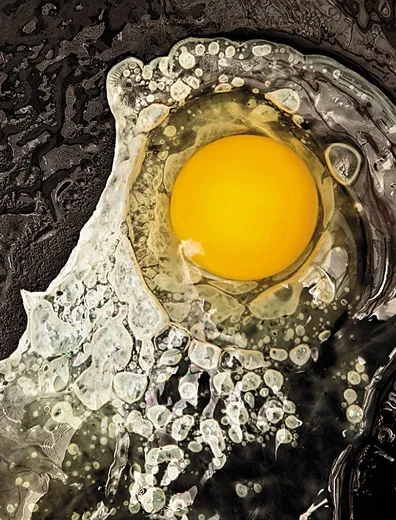How Do You Cook the Perfect Egg
Chefs and scientists try to solve the ultimate culinary puzzle
/https://tf-cmsv2-smithsonianmag-media.s3.amazonaws.com/filer/Chicken-Perfect-Egg-631.jpg)
“There is always a best way of doing everything, if it be to boil an egg,” Ralph Waldo Emerson wrote. But the best way to cook an egg—be it boiled, fried or poached—remains a surprisingly contentious subject in the world’s kitchens. A few seconds too long in the skillet or a single degree too high in hot water, eggsperts say, is all it takes to upset the delicate balance of texture, appearance and flavor.
“I don’t think we’ll ever reach a consensus about an ideal egg,” says Dominick Cerrone, an assistant professor at the Culinary Institute of America in Hyde Park, New York. Generally, he says, the criterion for a well-cooked egg is “a white that is tender but fully cooked, slightly creamy with a runny yolk.” Wylie Dufresne, the chef and owner of the renowned WD-50 restaurant in Manhattan, has especially high regard for the skills required to make an egg over-easy, but adds, “Usually, you have to leave the fine dining world and go to a diner to find one done properly.”
The egg is an elusive gastronomic quarry because the white and yolk are made of various proteins that thicken at different temperatures. For instance, the egg-white proteins ovotransferrin and ovalbumin don’t begin to coagulate until the temperature reaches 142 degrees and 184 degrees Fahrenheit, respectively; whereas the yolk proteins start thickening near 150 degrees.
But a French molecular gastronomist named Hervé This shook the culinary world in 2002 when he revealed to the famed chef Pierre Gagnaire that he had discovered l’oeuf à soixante-cinq degrés, “the 65-degree egg.” According to This, an egg slowly cooked at 65 degrees Celsius (149 degrees Fahrenheit)—in water or an oven—would be unmatched in flavor and texture. Moreover, he insisted that as long as the temperature remained constant, cooking time wasn’t important. Heat it for one hour or eight hours, he said, the outcome would be the same.
The 65-degree egg soon found its way onto the menus of chic restaurants worldwide. “It’s perfectly cooked from end to end,” raves Walter el Nagar, chef de cuisine at Il Grano restaurant in West Los Angeles. “The white has the consistency of a creamy egg yolk.” Nagar uses a 65-degree egg instead of the traditional fried egg atop his variation of the time-honored Italian dish Asparagi alla Milanese (tender asparagus in an emulsion of butter and parmigiano).
Still, not everyone buys the idea of a magic temperature. “There is no such thing as a 65-degree egg,” declares César Vega, a food chemist and co-editor of The Kitchen as Laboratory. His lab tests, published last year in the journal Food Biophysics, refute This’ theory and show that time does matter. Whether an egg cooks at 60, 65, or 68 degrees Celsius, the yolk will inevitably harden. An egg cooked at 65 degrees for 25 minutes will have a yolk that’s the consistency of sweetened condensed milk, he found; at 75 minutes, it’s the yellow version of Marmite. Using Vega’s research, chefs can create yolks tailored to whatever thickness they want.
Ultimately, the perfect egg is in the mouth of the beholder. Though on one point, there appears to be general agreement: “When an egg is overcooked,” Dufresne says, “it breaks my heart.”
/https://tf-cmsv2-smithsonianmag-media.s3.amazonaws.com/accounts/headshot/mark-strauss-240.jpg)

/https://tf-cmsv2-smithsonianmag-media.s3.amazonaws.com/accounts/headshot/mark-strauss-240.jpg)